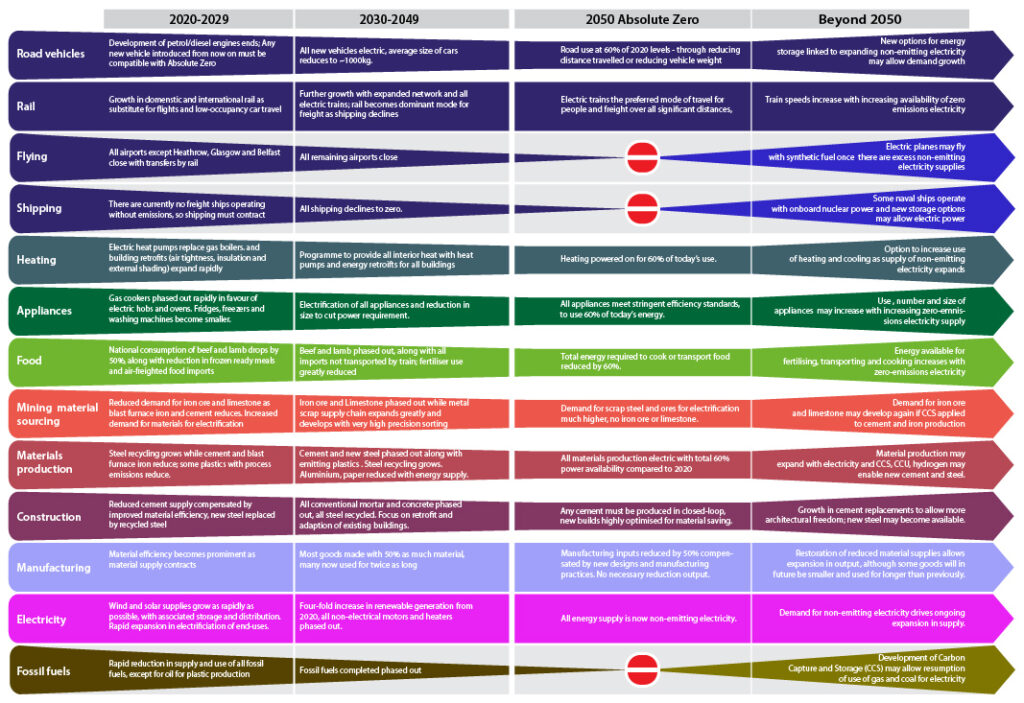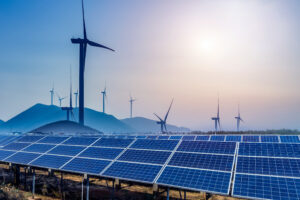Stay in touch.
If you would like to hear about future updates on Absolute Zero, please subscribe here.Introduction
We have to cut our greenhouse gas emissions to zero by 2050: that’s what climate scientists tell us, it’s what social protesters are asking for and it’s now the law in the UK. But we aren’t on track. For twenty years we’ve been trying to solve the problem with new or breakthrough technologies that supply energy and allow industry to keep growing, so we don’t have to change our lifestyles. But although some exciting new technology options are being developed, it will take a long time to deploy them, and they won’t be operating at scale within thirty years.
What can individuals do?
The big actions are: travel less distance by train or in small (or full) electric cars and stop flying; use the heating less and electrify the boiler when next upgrading; lobby for construction with half the material for twice as long; stop eating beef and lamb. Each action we take to reduce emissions, at home or at work, creates a positive ripple effect.
As individuals we can all work towards Absolute Zero through our purchasing and our influence. Each positive action we take has a double effect: it reduces emissions directly and encourages governments and businesses to be bolder in response. Where we cause emissions directly we can have a big effect by purchasing differently. Where they are released by organisations rather than individuals, we can lobby for change.
The actions stated as absolutes below are those which will be illegal in 2050 due to the Climate Change Act.
Living well
– The activities we most enjoy, according to the UK’s comprehensive time-use survey, are sports, social-life, eating, hobbies, games, computing, reading, tv, music, radio, volunteering (and sleeping!) We can all do more of these without any impact on emissions.
Travelling:
The impact of our travelling depends on how far we travel and how we do it. The most efficient way to travel is with a large number of people travelling in a vehicle with a small front and we can all reduce our total annual mileage.
– Stop using aeroplanes
– Take the train not the car when possible.
– Use all the seats in the car or get a smaller one
– Choose an electric car next time, if possible, which will become easier as prices fall and charging infrastructure expands.
– Lobby for more trains, no new roads, airport closure and more renewable electricity.
Heating and appliances:
Our energy bills are mainly driven by our heating and hot water.
– Use the boiler for less time, if possible, staying warm by only heating rooms if people are sitting in them, sealing up air gaps and adding insulation.
– Wear warmer clothes in winter.
– Next time you replace the boiler, choose an electric air or ground-source heat pump if possible
– Buy smaller more efficient appliances that last longer
Lobby for zero-carbon building standards, means-tested support for housing retrofit and more renewable electricity
Purchasing:
Most industrial emissions relate to producing materials, which are made efficiently but used wastefully so we need to reduce the weight of material made. The highest volumes of material are used not by households, but to make commercial and public buildings and infrastructure, industrial equipment and vehicles.
– Lobby businesses and the government to build buildings and infrastructure with half the material guaranteed for twice as long.
– When extending or modifying your home, try to choose recycled or re-used materials and avoid cement.
– Aim to reduce the total weight of material you purchase each year.
– Lobby for border controls on emissions in materials (like we have with food standards) to allow businesses fit for Absolute Zero to grow and prosper in the UK
Eating:
Small changes in diet can have a big effect.
– Reduce consumption of beef and lamb as these have far higher emissions than any other common food.
– Choose more locally sourced food if possible, to reduce food miles, particularly aiming to cut out air-freighted foods.
– Aim to use less frozen and processed meals as these dominate the energy use of food manufacturers.
– Lobby supermarkets to support farmers in using less fertiliser – it has a high impact, but much of it is wasted as it’s spread too far away from the plants.
Why this report matters
We are legally committed to reducing the UK’s emissions to zero by 2050, and there isn’t time to do this by deploying technologies that don’t yet operate at scale. We need a public discussion about the changes required and how to convert them into a great Industrial Strategy.
Other Key Messages
- Apart from flying and shipping, all of our current uses of energy could be electrified. With tremendous commitment the UK could generate enough non-emitting electricity to deliver about 60% of our current final energy-demand, but we could make better use of that through incremental changes in the technologies that convert energy into transport, heating and products.
- If we only used electricity, delivering all the transport, heat and goods we use in the UK would require 3x more electricity than we use today. If we expand renewables as fast as we can, we could deliver about 60% of this requirement with zero emissions in 2050. Therefore in 2050 we must plan to use 40% less energy than we use today, and all of it must be electric.
- In addition to reducing our energy demand, delivering zero emissions with today’s technologies requires the phasing out of flying, shipping, lamb and beef, blast-furnace steel and cement. Of these, shipping is currently crucial to our well-being – we import 50% of our food – and we don’t know how to build new buildings or install renewables without cement. The need for this restraint will be relieved as innovation is deployed but many of our most valued activities can continue and expand, and Absolute Zero creates opportunities for growth in many areas.
- With incremental changes to our habits and technologies, there are multiple options for living just as well as we do today, with 60% of the energy. With electric heat pumps and better insulation we can stay just as warm. With smaller electric cars we can keep moving, and by using materials better, we can make buildings and goods compatible with our zero emissions law.
- Most of today’s UK lifestyles can continue and grow within the target of Absolute Zero. Changing the way we travel (in particular not flying, and making better use of wheeled vehicles), stay warm (using electric heat pumps instead of gas boilers) and eat (cutting out lamb and beef) are the most important changes that we would notice. In parallel, small changes in the design of buildings and vehicles can make them more efficient. However the biggest challenge revealed in this section is the use of shipping for freight: at the moment we have no alternatives.
- Because of the emissions associated with their production, cement and new steel cannot be produced with zero emissions. Steel can be recycled effectively, but we need urgent innovation to find a cement supply. Under the conditions of Absolute Zero, the availability of most other materials will be proportion to the amount of non-emitting electricity available to the sector.
- Construction uses half of all steel and all cement, but has developed to use them inefficiently. The requirements for materials in construction could be reduced to achieve Absolute Zero by avoiding over-specification and over-design, by structural optimisation and with re-use.
- Driven by inventive new embodied emissions standards, manufacturing will adapt to three major changes: 1) reduced availability of current inputs, 2) radically different product composition and requirements, and 3) the existential need for improved resource efficiency.
- The problem with breakthrough technologies is not our shortage of ideas, but the very long time required to take a laboratory-scale idea through the technical and commercial development cycle before it can begin to capture a substantial share of the world market.
- No one actor can bring about Absolute Zero. Delivering it is a journey depending on co-operative action by individuals, businesses and governments acting on good information.
- Changes to social norms and individual behaviours can be positively framed to appeal to human fulfilment. Motivated individuals can be as effective at work as at home.
- Agreed roadmaps, new forms of market pull and collaboration are needed to spread the required technological innovation through industry.
- The effective price of carbon must be prohibitively large by 2050. A key issue for how to implement this is the timeline for how the price must grow (or restrictions must become more strict) from now to 2050.
- Good information is critical to transitions in individual behaviour, business operations and in supporting government action, but there are challenges to overcome in collecting and communicating the required information effectively to support decisions and influence behaviour.
- Absolute zero requires societal change. This will provide opportunities for growth in business, education and research, governance and industrial strategy. To achieve zero emissions we must only pursue the right opportunities and restrain activities which are no longer compatible with a zero emission society.








